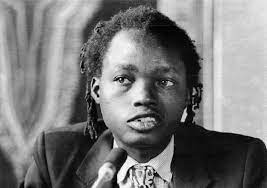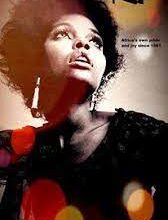Dambudzo Marechera – Genius or and Mental Case?
Walking Down The Memory Lane - Lest We Forget | 1ZimLegends

Dambudzo Marechera

By Tapfuma Machakaire
Genius or and Mental Case?
No one would be persecuted for assuming that Dambudzo Marechera was mentally challenged, although Dambudzo himself would have argued that those who did not understand him are deranged.
In 1977 after creating chaos at college in England he was given the choice of voluntary psychiatric treatment or expulsion, and he chose the latter, thus prematurely ending his academic career.
He is the man who said he had no ear for slogans and would run if its, “I love you time”. A close scrutiny of his poetic statements should leave most people pondering over the deeper meaning of his utterances. He grew up in poverty and reacted against his upbringing, adopting an increasingly self-destructive lifestyle.
The startling stories he shared in his writings about his father’s death could point to an element of mental instability. He said his father was either run over by a 20th century train or came home with a knife sticking from his back or was found in the hospital mortuary with his body riddled with bullets. What was wrong with the man whom some described as a genius?
Maybe Dambudzo’s background will help untangle the puzzle. Charles William Marechera, was born on June 4, 1952 in Vengere Township, Rusape to Isaac Marechera, a mortuary attendant, and Masvotwa Venenzia Marechera, a maid for white families that lived not far from the township. He was the third born in a family of nine. His favourite pastime was reading. In school he was always top of his class. His father was killed in a hit and run accident in 1966.
Left with nine children to bring up and unable to pay the rent, Marechera’s mother was evicted from her house in 1969. This forced the family to move to an even grimmer neighbourhood, mainly inhabited by prostitutes, pimps, and petty criminals. She eventually took to drinking and prostitution. At the age of 13, Dambudzo began to disassociate himself with the family by taking his few belongings and leaving the family home to escape the shame, the poverty, the chaos and, the pain.
Dambudzo grew up amid racial discrimination, poverty, and violence. He attended St. Augustine’s Mission, Penhalonga where initial signs of revolt emerged as he clashed with his teachers over the colonial teaching syllabus. He proceeded to the University of Rhodesia in 1972 and was expelled the following year after participating in a demonstration over the wages of black staff members.
He obtained a scholarship to New College, Oxford, but he was expelled in 1977 for trying to set fire to a college building.He began to display erratic behaviour, which may have been a result of excessive drinking which the school psychologist diagnosed as schizophrenia. After being expelled, he had technically become an illegal immigrant. He was threatened with deportation a couple of years later after getting arrested by the police in Cardiff for possession of cannabis. He ended up serving three months in prison.
After leaving Oxford he went into hibernation in some accounts he claimed to have been living in a tent by the river in Oxford, while in other accounts he claimed to have stayed with two rather shadowy friends, Shelagh and Peter, who converted their kitchen into a room for him. It was during this period that he wrote The House of Hungera book that tells of growing up in colonial Rhodesia in raw and exquisite prose.The book was awarded the 1979 Guardian Fiction Prize making him the first and only African to have won the award in 33 years. Prominent writers like Doris Lessing and Angela Carter hailed Marechera as “a genius” and “a prophet.”
Despite popular recognition brought by the publication of his book, Marechera remained disruptive and confrontational. He surprised his hosts when he started throwing plates and cups at the prize award ceremony.
In 1979, Marechera was invited to a cultural festival in West Germany.He did not carry his passport and his publisher was able to convince the immigration officers to let him on the plane to Germany without any valid travel document.
In Berlin he was promptly arrested by the frontier police and threatened with deportation to London. By the time he was rescued by the conference organizers, the news had spread through the conference halls that a writer was being detained. The festival, tagged “Berlin International Literature Days,” had brought to Berlin almost all the prominent African writers: Bessie Head, Chinua Achebe, Wole Soyinka, Dennis Brutus, Nuruddin Farah, and many others.
At the conference Dambudzo gave an impassioned reading from The House of Hunger, which was greeted with a standing ovation.
His second novel Black Sunlight published in 1980 is of a story that revolves around a photographer from Zimbabwe who travels across his war-ravaged country and discovers a warren of caves that a guerrilla army is using as its base.
In 1982 Dambudzo was approached by the British TV station, Channel Four, with a proposal for a film based on The House of Hunger. The first part of the movie was to cover Marechera’s rootless life in London, showing footage of the squats where he lived, with the remaining part covering his upbringing in Rhodesia. The first part was realized successfully, but trouble began as soon as Marechera and the film crew arrived in Zimbabwe in 1982.
Marechera was informed at the airport that his book, Black Sunlight, had been banned in Zimbabwe for being “blasphemous and obscene”. Then he started accusing his producer on the film project, Chris Austin, a white South African of being neo-colonial and exploitative in his dealings with the black crewmembers. The fall-out resulted in the filming contract being cancelled. Marechera was kicked out of the hotel where he had been booked and so began his next five years in the streets of Harare.
Marechera had left Zimbabwe eight years earlier, when it was under a white minority government. He had returned to an independent Zimbabwe under black majority government but in his view, nothing much had changed.
When Mindblast came out in 1985, some Zimbabweans were shocked by the harshness of his attack on the new government. He had attracted enemies and it is alleged that at one time he was severely assaulted by a senior military officer in a toilet. Mindblast was written at a time when Marechera was living rough on the streets, spending the nights on park benches the bookis amixture of poems and short stories anchored on a theme of disillusionment. The Depths of Diamonds, another book that Marechera wrote, was rejected for publication reportedly because of its obscenity.
It is said that when he was made a writer-in-residence at the University of Zimbabwe upon his return home, his mother and sisters attempted to come and meet him but he rejected them, accusing his mother of trying to kill him.
At one time in Harare, Marechera decided to be a story doctor who provided an outlet for people to vent. He opened a small office in the City Centre. All he had was a typewriter and a few books. The project only operated for four days before it was shut down by the government.
Dambudzo’s health had continued to deteriorate and he died on 18 August 1987 at the age of 35. He is regarded today as one of the most influential postcolonial African writers, fiction writer, poet, and playwright. He contributed poems to literary magazines and participated in student creative writing club, in the early 1970s.
World Literature Today critic, Tanure Ojaide wrote, “With Marechera’s death African literature lost a young star whose meteoric appearance has left an illuminating rail.”
Bibliography:
1978 The House of Hunger,1980: Black Sunlight, 1984: Mindblast or The Definitive Buddy,1992: The Black Insider,1992: Cemetery of Mind,1994: Scrapiron Blues



